新概念英语第一册47-48课(完整版)
新概念英语第一册课文(全中文)

新概念英语第一册课文(全中文)$课文1对不起!1对不起2什么事?3这是您的手提包吗?4对不起,请再说一遍.5这是您的手提包吗?6是的,是我的。
7非常感谢!$课文3对不起,先生.8请把我的大衣和伞拿给我.9这是我(寄存东西)的牌子.10谢谢,先生.11是5号.12这是您的伞和大衣13这不是我的伞。
14对不起,先生。
15这把伞是您的吗?16不,不是!17这把是吗?18是,是这把19非常感谢。
$课文5很高兴见到你。
20早上好。
21早上好,布莱克先生。
22这位是索菲娅23索菲娅是个新学生.24她是法国人。
25索菲娅,这位是汉斯。
26他是德国人。
27很高兴见到你.28这位是直子.29她是日本人。
30很高兴见到你。
31这位是昌宇。
32他是韩国人。
33很高兴见到你。
34这位是鲁明。
35他是中国人。
36很高兴见到你.37这位是晓惠。
38她也是中国人。
39很高兴见到你.$课文7你是教师吗?40我是个新学生,41我的名字叫罗伯特。
42很高兴见到你。
43我的名字叫索菲娅。
44你是法国人吗?45是的,我是法国人。
46你也是法国人吗?47不,我不是。
48你是哪国人?49我是意大利人。
50你是教师吗?51不,我不是。
52你是做什么工作的?53我是电脑录入员.54你是做什么工作的?55我是工程师。
$课文9今天好吗?56你好,海伦57你好,史蒂文58你今天好吗?59很好,谢谢你.60你好吗?61很好,谢谢。
62托尼好吗?63他很好,谢谢.64埃玛好吗?65她也很好,海伦。
66再见,海伦.67见到你真高兴.68我见到你也很高兴,史蒂文. 69再见.$课文11这是你的衬衫吗?70那是谁的衬衫?71戴夫,这是你的衬衫吗?72不,先生。
73这不是我的衬衫。
74这是我的衬衫。
75我的衬衫是蓝色的.76这件衬衫是蒂姆的吗?77也许是,先生。
78蒂姆的衬衫是白色的.79蒂姆!80什么事,先生。
81这是你的衬衫吗?82是的,先生。
83给你。
84接着!85谢谢您,先生。
新概念一册L47-L48课课件

New words
New words & expressions
★like v. ①喜欢; ②想要
Eg:Miss Wang is a good teacher, we like her. Do you like coffee?Yes, I do.你喜欢咖啡么?是的,我喜欢。 Would you like some coffee?你想要点咖啡吗?
one first
1st
two second 2nd
three third
3rd
four fourth
Байду номын сангаас
4th
five fifth
5th
six
sixth
6th
seven eight nine ten eleven twelve
seventh 7th eighth 8th ninth 9th tenth 10th eleventh 11th twelfth 12th
Do you like butter? Yes, I do. I like butter, but I don’t want any.
Numbers
英语中序数词必须与定冠词(the)连用, 如:the first month,the twelfth floor(12楼)
基数词 序数词 缩写 基数词 序数词 缩写
★Scotch whisky 苏格兰威士忌
Scotch adj. 苏格兰人的;苏格兰语的 Scotland苏格兰
★choice adj.上等的,精选的 n.选择
choice apples上等苹果 make a choice做选择 This is not my choice.
★apple n.苹果(可数名词)
新概念一lesson43-48课文及知识点
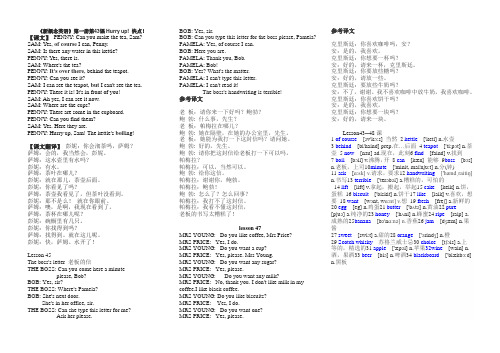
《新概念英语》第一册第43课Hurry up! 快点!【课文】PENNY: Can you make the tea, Sam? SAM: Yes, of course I can, Penny.SAM: Is there any water in this kettle? PENNY: Yes, there is.SAM: Where's the tea?PENNY: It's over there, behind the teapot. PENNY: Can you see it?SAM: I can see the teapot, but I can't see the tea. PENNY: There it is! It's in front of you!SAM: Ah yes, I can see it now.SAM: Where are the cups?PENNY: There are some in the cupboard. PENNY: Can you find them?SAM: Yes. Here they are.PENNY: Hurry up, Sam! The kettle's boil ing! 【课文翻译】彭妮:你会沏茶吗,萨姆?萨姆:会的,我当然会,彭妮。
萨姆:这水壶里有水吗?彭妮:有水。
萨姆:茶叶在哪儿?彭妮:就在那儿,茶壶后面。
彭妮:你看见了吗?萨姆:茶壶我看见了,但茶叶没看到。
彭妮:那不是么!就在你眼前。
萨姆:噢,是啊,我现在看到了。
萨姆:茶杯在哪儿呢?彭妮:碗橱里有几只。
彭妮:你找得到吗?萨姆:找得到。
就在这儿呢。
彭妮:快,萨姆。
水开了!Lesson 45The boss's letter 老板的信THE BOSS: Can you come here a minuteplease, Bob?BOB: Yes, sir?THE BOSS: Where's Pamela?BOB: She's next door.She's in her office, sir.THE BOSS: Can she type this letter for me?Ask her please. BOB: Yes, sir.BOB: Can you type this letter for the boss please, Pamela?PAMELA: Yes, of course I can.BOB: Here you are.PAMELA: Thank you, Bob.PAMELA: Bob!BOB: Yes? What's the matter.PAMELA: I can't type this letter.PAMELA: I can't read it!The boss's handwriting is terrible!参考译文老板:请你来一下好吗?鲍勃?鲍勃: 什么事,先生?老板:帕梅拉在哪儿?鲍勃: 她在隔壁,在她的办公室里,先生。
(完整)新概念英语第一册课文
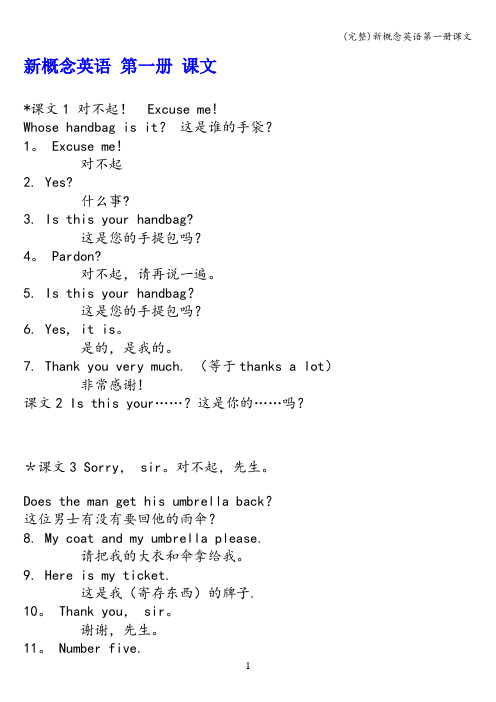
新概念英语第一册课文*课文1 对不起! Excuse me!Whose handbag is it?这是谁的手袋?1。
Excuse me!对不起2. Yes?什么事?3. Is this your handbag?这是您的手提包吗?4。
Pardon?对不起,请再说一遍。
5. Is this your handbag?这是您的手提包吗?6. Yes, it is。
是的,是我的。
7. Thank you very much. (等于thanks a lot)非常感谢!课文2 Is this your……?这是你的……吗?*课文3 Sorry, sir。
对不起,先生。
Does the man get his umbrella back?这位男士有没有要回他的雨伞?8. My coat and my umbrella please.请把我的大衣和伞拿给我。
9. Here is my ticket.这是我(寄存东西)的牌子.10。
Thank you, sir。
谢谢,先生。
11。
Number five.是5号。
12。
Here’s your umbrella and your coat。
这是您的伞和大衣13. This is not my umbrella。
这不是我的伞。
14。
Sorry, sir.对不起,先生.15. Is this your umbrella?这把伞是您的吗?16. No, it isn't.不,不是!17. Is this it?这把是吗?18. Yes, it is。
是,是这把19。
Thank you very much.非常感谢。
*课文4 Is this your……?这是你的……吗?*课文5 Nice to meet you。
很高兴见到你。
Is Chang-woo Chinese ?昌宇是中国人吗?20. Good morning.早上好。
21。
Good morning, Mr. Blake。
(word完整版)新概念英语第一册分课单词(含音标)
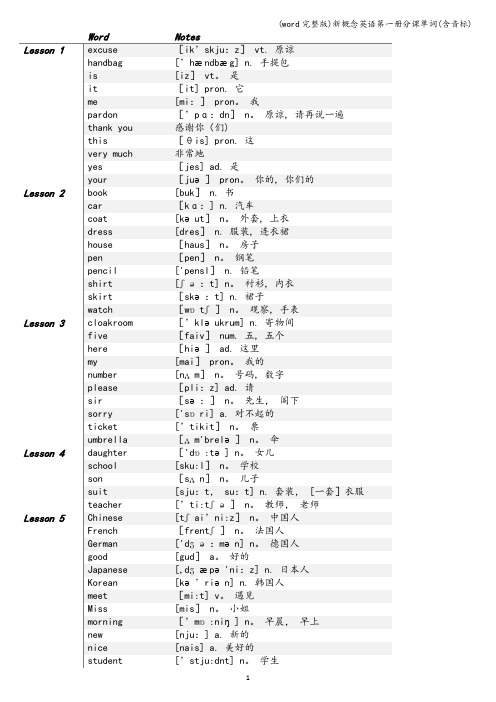
(word完整版)新概念英语第一册分课单词(含音标) Word NotesLesson 1excuse[ik’skju:z] vt. 原谅handbag[’hændbæg] n. 手提包is[iz] vt。
是it[it] pron. 它me[mi:] pron。
我pardon[’pɑ:dn] n。
原谅, 请再说一遍thank you感谢你(们)this[θis] pron. 这very much非常地yes[jes] ad. 是your[juә] pron。
你的, 你们的Lesson 2book[buk] n. 书car[kɑ:] n. 汽车coat[kәut] n。
外套, 上衣dress[dres] n. 服装, 连衣裙house[haus] n。
房子pen[pen] n。
钢笔pencil['pensl] n. 铅笔shirt[ʃә:t] n。
衬衫, 内衣skirt[skә:t] n. 裙子watch[wɒtʃ] n。
观察, 手表Lesson 3cloakroom[’klәukrum] n. 寄物间five[faiv] num. 五, 五个here[hiә] ad. 这里my[mai] pron。
我的number[nʌm] n。
号码, 数字please[pli:z] ad. 请sir[sә:] n。
先生,阁下sorry['sɒri] a. 对不起的ticket[’tikit] n。
票umbrella[ʌm'brelә] n。
伞Lesson 4daughter['dɒ:tә] n。
女儿school[sku:l] n。
学校son[sʌn] n。
儿子suit[sju:t, su:t] n. 套装, [一套]衣服teacher[’ti:tʃә] n。
教师,老师Lesson 5Chinese[tʃai’ni:z] n。
中国人French[frentʃ] n。
新概念英语第一册47课ppt课件

课文讲解
• Do you like coffee, Ann? • Do you want a cup? • Do you want any sugar? • Do you want any milk? • Do you like biscuits? • Do you want one? • 请仔细观察这些句子,有何共同特
B: Yes, I do . No . I don’t .
2 . A: Do you want any sugar? B: Yes, I do .
No, I don’t .
Language Points
sth.
1.like to do sth.
doing sth.
sth.
2.want to do sth.
★wa nt
; 希望
v. 想
. want sth. 想 要 某 物
What do you want?
I want some tea .
want sb. to do sth. 想让某人做某事
. 妈妈想让我好好学习
. Mother wants me to study hard. . ② v. 需要
. My shoes want cleaning.
I don' t like milk in my coffee . I like black coffee .
Do you like biscuits? Yes . I do . Do you want one?
Yes, please .
Key Structures
1 . A: Do you like coffee?
Practice
•你喜欢 …吗? •Do you like…? •你想要…吗? •Do you want…?
新概念英语第一册课文原文+精讲汇总(144课完整版)
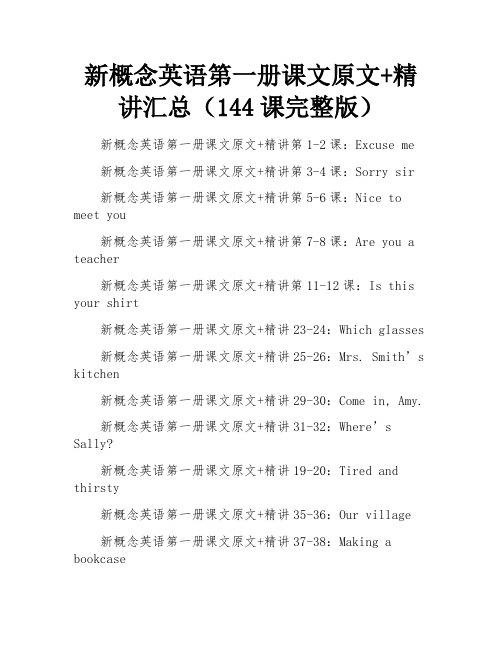
新概念英语第一册课文原文+精讲汇总(144课完整版)新概念英语第一册课文原文+精讲第1-2课:Excuse me新概念英语第一册课文原文+精讲第3-4课:Sorry sir新概念英语第一册课文原文+精讲第5-6课:Nice to meet you新概念英语第一册课文原文+精讲第7-8课:Are you a teacher新概念英语第一册课文原文+精讲第11-12课:Is this your shirt新概念英语第一册课文原文+精讲23-24:Which glasses新概念英语第一册课文原文+精讲25-26:Mrs. Smith’s kitchen新概念英语第一册课文原文+精讲29-30:Come in, Amy.新概念英语第一册课文原文+精讲31-32:Where’s Sally?新概念英语第一册课文原文+精讲19-20:Tired and thirsty新概念英语第一册课文原文+精讲35-36:Our village新概念英语第一册课文原文+精讲37-38:Making a bookcaseit!新概念英语第一册课文原文+精讲41-42:Penny’s bag新概念英语第一册课文原文+精讲33-34:A fine day新概念英语第一册课文原文+精讲43-44:Hurry up新概念英语第一册课文原文+精讲45-46:The boss’s letter新概念英语第一册课文原文+精讲47-48:A cup of coffee新概念英语第一册课文原文+精讲53-54:An interesting climate新概念英语第一册课文原文+精讲55-56:The Sawyer family新概念英语第一册课文原文+精讲57-58:An unusual day新概念英语第一册课文原文+精讲59-60:Is that all新概念英语第一册课文原文+精讲61-62:A bad cold新概念英语第一册课文原文+精讲63-64:Thank you , doctor新概念英语第一册课文原文+精讲67-68:The weekend新概念英语第一册课文原文+精讲69-70:The car race新概念英语第一册课文原文+精讲71-72:He’s awfulKing Street新概念英语第一册课文原文+精讲75-76:Unfortable shoes新概念英语第一册课文原文+精讲77-78:Terrible toothache新概念英语第一册课文原文+精讲81-82:Roast beef and potato新概念英语第一册课文原文+精讲83-84:Going on a holiday新概念英语第一册课文原文+精讲85课:Paris in the Spring新概念英语第一册课文原文+精讲87课:A car crash新概念英语第一册课文原文+精讲89课:For sale新概念英语第一册课文原文+精讲91课:Poor Ian新概念英语第一册课文原文+精讲93课:Our new neighbor新概念英语第一册课文原文+精讲95课:Ticket, please.新概念英语第一册课文原文+精讲97课:A small blue case新概念英语第一册课文原文+精讲99课:Ow!新概念英语第一册课文原文+精讲101课:A card from Jimmytest新概念英语第一册课文原文+精讲105课:Full of mistakes新概念英语第一册课文原文+精讲107课:It’s too small新概念英语第一册课文原文+精讲109课:A good idea新概念英语第一册课文原文+精讲111课:The most expensive model新概念英语第一册课文原文+精讲113课:small change新概念英语第一册课文原文+精讲115课:Knock,knock新概念英语第一册课文原文+精讲117课:Tommy’s breakfast新概念英语第一册课文原文+精讲119课: A true story新概念英语第一册课文原文+精讲121课: The man in the hat新概念英语第一册课文原文+精讲123课: A trip to Australia新概念英语第一册课文原文+精讲125课: Tea for two新概念英语第一册课文原文+精讲127课: A famous actress新概念英语第一册课文原文+精讲129课: 70 miles an hour新概念英语第一册课文原文+精讲133课: Sensational news新概念英语第一册课文原文+精讲135课:The latest新概念英语第一册课文原文+精讲139课:Is that you新概念英语第一册课文原文+精讲第141课:Sally’s first新概念英语第一册课文原文+精讲131课:Don’t be so sure。
新概念第一册 lesson 47-48 课堂及课后练习
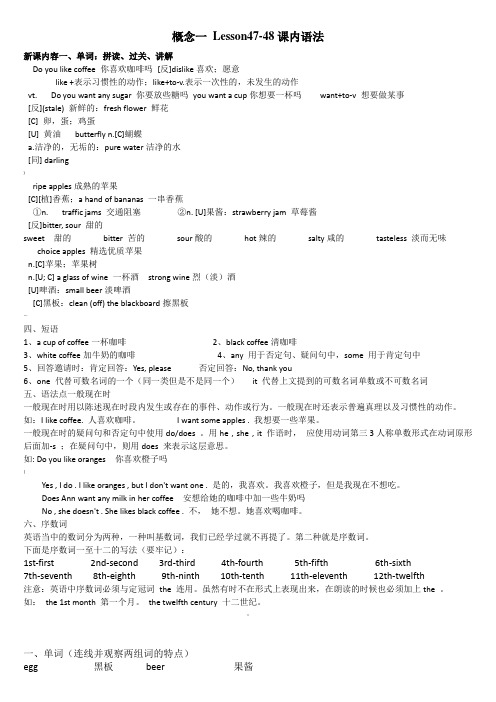
概念一Lesson47-48课内语法新课内容一、单词:拼读、过关、讲解Do you like coffee 你喜欢咖啡吗[反]dislike喜欢;愿意like +表示习惯性的动作;like+to-v.表示一次性的,未发生的动作vt. Do you want any sugar 你要放些糖吗you want a cup你想要一杯吗want+to-v 想要做某事[反](stale) 新鲜的:fresh flower 鲜花[C] 卵,蛋;鸡蛋[U] 黄油butterfly n.[C]蝴蝶a.洁净的,无垢的:pure water洁净的水[同] darling)ripe apples成熟的苹果[C][植]香蕉;a hand of bananas 一串香蕉①n. traffic jams 交通阻塞②n. [U]果酱:strawberry jam 草莓酱[反]bitter, sour 甜的sweet 甜的bitter 苦的sour酸的hot辣的salty咸的tasteless 淡而无味choice apples 精选优质苹果n.[C]苹果;苹果树n.[U; C] a glass of wine 一杯酒strong wine烈(淡)酒[U]啤酒:small beer淡啤酒[C]黑板:clean (off) the blackboard擦黑板…四、短语1、a cup of coffee一杯咖啡2、black coffee清咖啡3、white coffee加牛奶的咖啡4、any 用于否定句、疑问句中,some 用于肯定句中5、回答邀请时:肯定回答:Yes, please 否定回答:No, thank you6、one 代替可数名词的一个(同一类但是不是同一个)it 代替上文提到的可数名词单数或不可数名词五、语法点一般现在时一般现在时用以陈述现在时段内发生或存在的事件、动作或行为。
一般现在时还表示普遍真理以及习惯性的动作。
新概念英语第一册Lesson47-48笔记(语法点+配套练习+答案)
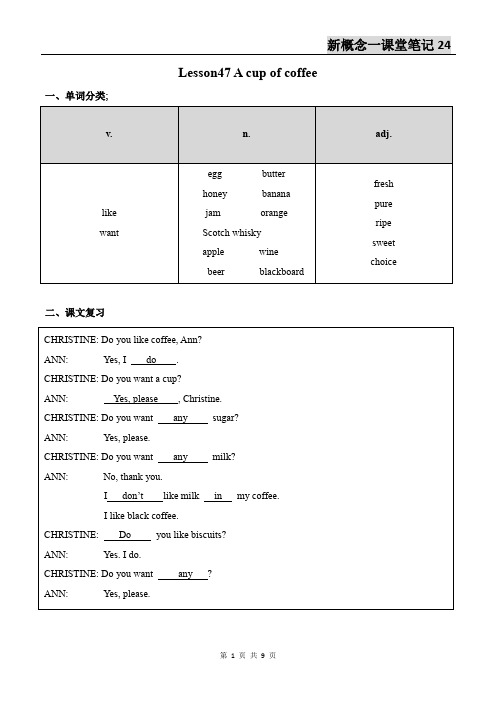
例句
like v.喜欢
后跟可数名词复数/不可数名词
I likeapple(apple), I don’t likemilk(milk).
What’s your hobby? I likerunning(run).
want v.想,想要
后跟名词
want to do sth.想要做某事
Do you want anybananas(banana)?
跳下树枝
swim across the river
游过小河
in the front of
在(内部)的前面
5、语法解析
1.like的用法
1like+可数名词复数
I likeapples(apple).
She likesdogs(dog).
We don’t likebananas(banana).
I like oranges.我喜欢橙子。
I like water.
否定句:I don’t like water.
We like running.
否定句:I don’t like running.
I want to sleep.
否定句:I don’t want to sleep.
They want to play outside.
否定句:They don’t want to play outside.
He wants youto help(help) me.
We want himto learn(learn) swimming.
The girl wantsto dance(dance) in the park.
练习:
I want agift(gift).
新概念英语第一册第47-48课A cup of coffee

新概念英语第一册第47-48课:A cup of coffee Lesson 47 A cup of coffee一杯咖啡Listen to the tape then answer this question. How does Ann like her coffee?听录音,然后回答问题。
安想要什么样的咖啡?MRS YOUNG: Do you like coffee, Mrs Price?克里斯廷:你喜欢咖啡吗,安?MRS PRICE: Yes, I do.安:是的,我喜欢。
MRS YOUNG: Do you want a cup?克里斯廷:你想要一杯吗?MRS PRICE: Yes, please. Mrs Young.安:好的,请来一杯,克里斯廷。
MRS YOUNG: Do you want any sugar?克里斯廷:你要放些糖吗?MRS PRICE: Yes, please.安:好的,请放一些。
MRS YOUNG: Do you want any milk?克里斯廷:要放些牛奶吗?MRS PRICE: No, thank you. I don't like milk in my coffee.I like black coffee.安:不了,谢谢。
我不喜欢咖啡中放牛奶,我喜欢咖啡。
MRS YOUNG: Do you like biscuits?克里斯廷:你喜欢饼干吗?MRS PRICE: Yes, I do.安:是的,我喜欢。
MRS YOUNG: Do you want one?克里斯廷:你想要一块吗?MRS PRICE: Yes, please.安:好的,请来一块。
New Word and expressions 生词和短语likev. 喜欢,想要wantv. 想Notes on the text课文注释1 Do you want a cup?句中的a cup后面省略了of coffee。
新概念英语第一册 Lesson 47-48(共23张ppt)

honey /ˈhʌni/ : 蜂蜜 ;(用作称呼)亲爱的 Honey, I don't really think that's a good idea. pure honey
ripe /raɪp/ (水果、谷物) 成熟的 ripe fruit
mature /məˈtʃʊə(r)/ (人)成熟的 immature /ˌɪməˈtjʊə/
must/can/have to The light is on,so he ____ be at home now. It’s too late,I _____ leave now. I know I ______ study hard. My mother is ill. I ________ look after her at home. Need I stay here ? (肯/否回答)
多么有趣的故事啊! 多么漂亮的花啊! 多么令人激动的消息啊! 我们多幸运啊!
用What\how填空 _____ a bright boy he is! _____ bright the boy is! _____ good apples they are! _____ good the apples are! _____ cold weather it is! _____ cold the weather is!
What+形容词+名词+主语+动词! How+ 形容词/副词+ 主语 +动词
他很成熟。
rope /rəʊp/ :绳,绳索
jam /dʒæm/:果酱(un.);堵塞(n./v.), 卡住; In some cities this morning, there were traffic jams up to 40 miles long.
新概念英语第一册Lesson47~52课后答案

新概念英语第一册Lesson47~52课后答案新概念英语第一册Lesson47~48课后答案A1 The aeroplane is flying over the village.2 The ship is going under the bridge.3 The children are swimming across the river.4 Two cats are running along the wall.5 The boy is jumping off the branch.6 The girl is sitting between her mother and her father.7 The teacher is standing in front of the blackboard.8 The blackboard is behind the teacher.B1 Do you like honey?Yes, I do. I like honey, but I don’t want any.2 Do you like bananas?Yes, I do. I like bananas, but I don’t want one.3 Do you like jam?Yes, I do. I like jam, but I don’t want any.4 Do you like oranges?Yes, I do. I like oranges, but I don’t want one.5 Do you like ice cream?Yes, I do. I like ice cream, but I don’t want any.6 Do you like whisky?Yes, I do. I like whisky, but I don’t want any.7 Do you like apples?Yes, I do. I like apples, but I don’t want one.8 Do you like wine?Yes, I do. I like wine, but I don’t want any.9 Do you like biscuits?Yes, I do. I like biscuits, but I don’t want one.10 Do you like beer?Yes, I do. I like beer, but I don’t want any.新概念英语第一册Lesson49~50课后答案A1 He likes coffee, but I don’t.2 She likes tea, but he doesn’t.3 He is eating some bread, but she isn’t.4 She can type very well, but he can’t.5 They are working hard, but we aren’t.6 He is reading a magazine, but I am not.B1 Does Sam like cabbage?Yes, he does. He likes cabbage, but he doesn’t want any.2 Does Sam like lettuce?Yes, he does. He likes lettuce, but he doesn’t want any.3 Do you like peas?Yes, I do. I like peas, but I don’t want any.4 Does Mrs. White like beans?Yes, she does. She likes beans, but she doesn’t want any.5 Do you like bananas?Yes, I do. I like bananas, but I don’t want any.6 Does Mr. Jones like oranges?Yes, he does. He likes oranges, but he doesn’t want any.7 Does George like apples?Yes, he does. He likes apples, but he doesn’t want any.8 Does Elizabeth like pears?Yes, she does. She likes pears, but she doesn’t want any.9 Do you like grapes?Yes, I do. I like grapes, but I don’t want any.10 Does Carol like peaches?Yes, she does. She likes peaches, but she doesn’t want any.新概念英语第一册Lesson51~52课后答案A1 We come from Germany, but Dimitri comes from Greece.2 I like cold weather, but he likes warm weather.3 He comes from the U.S., but she comes from England.4 She doesn’t like the winter, but she likes the summer.5 I come from Norway, but you come from Spain.6 Stella comes from Spain, but Hans and Karl come from Germany.7 We don’t come from Spain. We come from Brazil.B1 Where does she come from? Does she come from England?No, she doesn’t come from England. She comes from the U.S.What nationality is she?She’s American.2 Where do they come from? Do they come from France?No, they don’t come from France. They come from England.What nationality are they?They’re English.3 Where does he come from? Does he come from France?No, he doesn’t come from France. He comes from Germany.What nationality is he?He’s German.4 Where does he come from? Does he come from Italy?No, he doesn’t come from Italy. He comes from Greece.What nationality is he?He’s Greek.5 Where do they come from? Do they come from Greece?No, they don’t come from Greece. They come from Italy.What nationality are they?They’re Italian.6 Where do they come from? Do they come from Brazil?No, they don’t come from Brazil. They come from Norway.What nationality are they?They’re Norwegian.7 Where do they come from? Do they come from Norway?No, they don’t come from Norway. They come from Greece.What nationality are they?They’re Greek.8 Where does she come from? Does she come from Italy?No, she doesn’t come from Italy. She comes from Spain.What nationality is she?She’s Spanish.9 Where does she come from? Does she come from Norway?No, she doesn’t come from Norway. She comes from France.What nationality is she?She’s French.10 Where does he come from? Does he come from the U.S.?No, he doesn’t come from the U.S. He comes from Brazil.What nationality is he?He’s Brazilian.。
新概念第一册Lesson47-48图文

I like ______ very much.
A. to sing
B. singing
I want Lucy _______ some eggs.
A. buy
B. to buy
want sb. to do sth. 想要某人干某事
“I like coffee. Do you like coffee?” Today we’ll learn a
Scotch whisky 苏格兰威士忌
Scotch [skɔtʃ]
adj. 苏格兰人的;苏格兰语的
choice
adj.上等的
choice apples. 上等的苹果。
Choice n.选择 Make a choice 做决定,做选择
apple
n.苹果
There are some apples and an orange in the basket.
CHRISTINE: Do you want a cup? ANN: Yes,please,Christine.
want a cup:want a cup of coffee
want sb.to do sth. 我想让你把那本书给我。 I want you to give me the book. 你妈妈想让你回家。 Your mother wants you to go home.
sweet
adj.甜的
orange
n.橙
Scotch whisky 苏格兰威 士忌
choice
adj.上等的
apple
n.苹果
wine
n.酒
beer
n.啤酒
blackboard n.黑板
prep. 像 enjoy v. 喜欢 love v. 爱;喜爱
新概念英语第一册Lesson47+A+cup+of+coffee+讲义

Lesson 47 A cup of coffee一杯咖啡CHRISTINE: Do you like coffee, Ann?ANN: Yes, I do.CHRISTINE: Do you want a cup?ANN: Yes, please, Christine.CHRISTINE: Do you want any sugar?ANN: es, please.CHRISTINE: Do you want any milk?ANN: No, thank you. I don't like milk in my coffee. I like black coffee. CHRISTINE: Do you like biscuits?ANN: Yes. I do.CHRISTINE: Do you want one?ANN: Yes, please.参考译文克里斯廷:你喜欢咖啡吗,安?安:是的,我喜欢。
克里斯廷:你想要一杯吗?安:好的,请来一杯,克里斯廷。
克里斯廷:你要放些糖吗?安:好的,请放一些。
克里斯廷:要放些牛奶吗?安:不了,谢谢。
我不喜欢咖啡中放牛奶,我喜欢咖啡。
克里斯廷:你喜欢饼干吗?安:是的,我喜欢。
克里斯廷:你想要一块吗?安:好的,请来一块。
本课重点1.Do you like coffee, Ann? Yes, I do.你喜欢咖啡吗?安?是的,我喜欢。
1) sb. like(s) sth.这个句型常常用来表示“某人喜欢或想要…”例如:I like rice, but I don’t like noodles.我喜欢米饭,但我不喜欢面条。
2)这是一个一般疑问句的肯定回答,并且是一句简略回答。
完整的回答应为:Yes, I like coffee. 为了避免重复,回答时用问句中的助动词do来代替like coffee。
如果是否定回答,则为:No, I don’t.2.Do you want a cup?你想要一杯吗?1)通过上下文我们知道,这里的a cup实际上指的是 a cup of coffee。
新概念英语第一册47课课文

新概念英语第一册47课课文
《新概念英语第一册》第47课的课文是关于"An Ideal Teacher"(理想的老师)的。
这篇课文主要描述了作者对理想的老师的看法和期望。
作者认为理想的老师应该具备以下几个特点,首先,他们应该对教学充满热情和激情,能够激发学生对知识的兴趣。
其次,他们应该具备广博的知识和深厚的学术背景,能够传授给学生全面而深入的知识。
此外,理想的老师还应该关注学生的个性和需求,能够根据学生的特点和能力制定个性化的教学计划,帮助他们充分发展潜力。
此外,理想的老师还应该具备良好的沟通能力和耐心,能够与学生建立良好的师生关系,理解并满足他们的学习需求。
他们应该鼓励学生积极参与课堂讨论和思考,培养他们的批判性思维和解决问题的能力。
同时,他们也应该注重培养学生的道德品质和社交技能,帮助他们成为有责任感和担当的公民。
总之,理想的老师是一位充满热情、知识渊博、关心学生个性和需求、善于沟通和启发学生思考的教育者。
他们的存在和影响能
够激励学生积极学习,发展自己的潜力,并为社会做出积极的贡献。
以上是对《新概念英语第一册》第47课课文的多角度全面回答,希望能够满足你的需求。
新概念英语Lesson47-48(共19页)-3课件
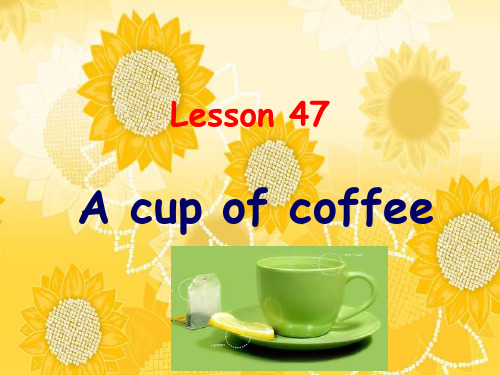
have _h_a_s_
一.用动词的适当形式填空。 1. We often __p_la_y__ (play) in the playground. 2. He _g_e_ts__(get) up at six o’clock. 3. Danny s_t_u_d_i_es (study) English, Chinese,
I like learning English. =I like to learn English.
2. Tim 想去打篮球。Tim wants to play basketball.
数阅
学读
使使
人人
精充
细实
;;
博会
物谈
使使
人人
深敏
沉捷
;;
You made my day!
伦 理 使 人 庄 重 ; 逻 辑 与 修 辞 使 人 善 辩 。
Practice
பைடு நூலகம்
skating
donS’tawmanltike
(skate)very much.
DoesI
s(winmomt iwnagnt)to drink tea.
hambusrgheers like
(swim)?
I like any milk(hamburger).
Do you want reading (some milk)?
—Do you like eggs? —Yes,I do. I like eggs,but I don’t want one.
新概念英语第一册第47课

基数词变序数词+ th
一、二、三,单独记, 八去t, 九除e, ve要用f替, 整十基数变序数,先把ty变成tie; 要是遇到两位数,十位基数个位序, th最后加上去。
.
• 第一 first • 第二 second • 第三 third • 第五 • 第八 • 第九 • 第十二 • 第二十一
.
.
egg n. 鸡蛋
• egg cup • 我不喜欢吃鸡蛋。 • I don’t like to eat eggs.
.
butter n. 黄油
• butterfly
.
pure adj. 纯净的
• pure drinking water
.
honey n. 蜂蜜
.
ripe adj. 成熟的
• 这些苹果不是熟的。 • These apples are not ripe.
• like to do sth • like doing sth • 我喜欢刷碗。 • I like washing dishes. • I don’t like washing dishes. • Do you like washing dishes? • Yes, I do. • No, I don’t.
.
banana n. 香蕉.源自jam n. 果酱.
sweet adj. 甜的
• You are sweet.
.
orange n. 橙
.
Scotch whisky
• 一杯苏格兰威士忌 • a cup of Scotch whisky
.
choice adj. 精选的,上等的
.
apple n. 苹果
.
want v. 想要
新概念英语第一册48课讲解
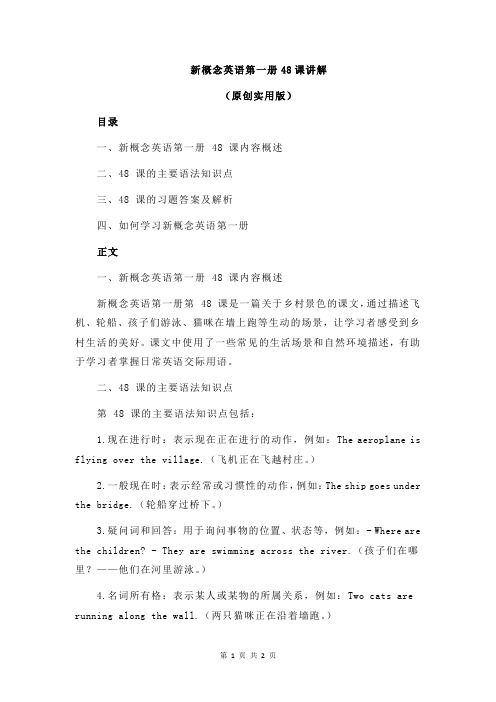
新概念英语第一册48课讲解(原创实用版)目录一、新概念英语第一册 48 课内容概述二、48 课的主要语法知识点三、48 课的习题答案及解析四、如何学习新概念英语第一册正文一、新概念英语第一册 48 课内容概述新概念英语第一册第 48 课是一篇关于乡村景色的课文,通过描述飞机、轮船、孩子们游泳、猫咪在墙上跑等生动的场景,让学习者感受到乡村生活的美好。
课文中使用了一些常见的生活场景和自然环境描述,有助于学习者掌握日常英语交际用语。
二、48 课的主要语法知识点第 48 课的主要语法知识点包括:1.现在进行时:表示现在正在进行的动作,例如:The aeroplane is flying over the village.(飞机正在飞越村庄。
)2.一般现在时:表示经常或习惯性的动作,例如:The ship goes under the bridge.(轮船穿过桥下。
)3.疑问词和回答:用于询问事物的位置、状态等,例如:- Where are the children? - They are swimming across the river.(孩子们在哪里?——他们在河里游泳。
)4.名词所有格:表示某人或某物的所属关系,例如:Two cats are running along the wall.(两只猫咪正在沿着墙跑。
)三、48 课的习题答案及解析1.问题:What is the aeroplane doing?解答:The aeroplane is flying over the village.2.问题:What is the ship doing?解答:The ship is going under the bridge.3.问题:What are the children doing?解答:The children are swimming across the river.4.问题:What are the cats doing?解答:Two cats are running along the wall.5.问题:What is the boy doing?解答:The boy is jumping off the wall.四、如何学习新概念英语第一册学习新概念英语第一册可以采用以下方法:1.仔细阅读课文,理解课文内容,学习其中的语法知识和词汇。
新概念英语第一册47课ppt课件
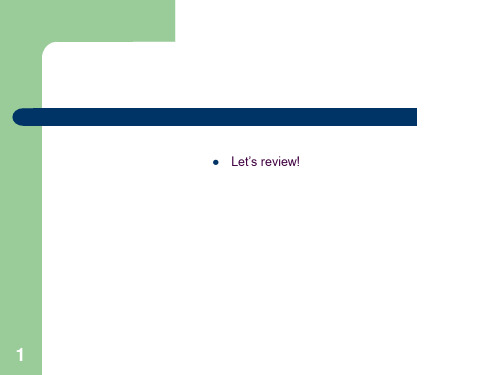
17
D课o文y讲ou解like coffee, Ann? Do you want a cup? Do you want any sugar? Do you want any milk? Do you like biscuits? Do you want one? 请仔细观察这些句子,有何共同特点?
Let’s review!
1
2
肯定句 主语+can+动词原形~.
否定句 主语+can+not+动词原形~.
一般疑问句 Can+主语+动词原形~?源自can的句型结构3
我会说英语。 I can speak English. 我会煮晚饭。 I can cook dinner.
4
1. 我不会踢足球。 2. 我不会做书架。 3. 她不会做作业。 4. 我们不会沏茶。 1. I can’t play football. 2. I can’t make bookcase. 3. She can’t do the homework. 4. We can’t make the tea.
24
例子
1.我打印这封信。(肯定句) I type this letter. 2.我没有打印这封信。(否定句) I don't type this letter. 3.你打印这封信了吗?(一般疑问句) Do you type this letter? {肯定回答:Yes,I do.是的,我打了。 否定回答:No,I don't.不,我没有。}
要用do。 4.含有实义动词的肯定句,变否定句时,直接在动词前加上don't,其余不变。
【主语是第一、二人称,复数人称,或名词复数】 5.含有实义动词的肯定句,变一般疑问句时,要在句首前(主语)加上Do,
- 1、下载文档前请自行甄别文档内容的完整性,平台不提供额外的编辑、内容补充、找答案等附加服务。
- 2、"仅部分预览"的文档,不可在线预览部分如存在完整性等问题,可反馈申请退款(可完整预览的文档不适用该条件!)。
- 3、如文档侵犯您的权益,请联系客服反馈,我们会尽快为您处理(人工客服工作时间:9:00-18:30)。
What do you want? Do you want some tea? • want sb. to do sth. 想某人做某事 • 老板想让他为他打一封信
• The boss wants he to type a letter for him.
Today we’ll learn a story about having coffee.
CHRISTINE: Do you like coffee, Ann?
ANN:
Yes, I do.
CHRISTINE: Do you want a cup?
ANN:
Yes, please, Christine.
five fifth
5th
six sixth 6th
seven seventh 7th
eight eighth 8th
nine ninth 9th
ten tenth 10th eleven eleventh 11th twelve twelfth 12th
序数词:序数词从字意来看,表示:第几。一般情况下在基 数词后面加-th,有以下口诀助记:
n.苹果
• 篮子里有些苹果。
• There are some apples in the basket.
• the apple of sb’s eye
• 某人最喜欢的人或物
• …心肝宝贝/掌上明珠
• 她儿子是她的掌上明珠。
• Her son is the apple of her eye.
wine beer
I like to have a cup of coffee.
• 2.like doing sth.喜欢做某事 • 我喜欢踢足球。 • I like playing football.
• like to do 指短期的事情,偶然性的喜好。 • like doing sth.指习惯性,长期的喜好。
★want v. 想
n.酒(不可数) n.啤酒(不可数)
• 我想要一些酒。 • I want some wine. • 他正在和他的朋友们喝啤酒。
• He is drinking beer with his friends.
Ordinal numbers序数词
one first 1st two second 2nd three third 3rd four fourth 4th
Latte 拿铁(意式奶泡咖啡)
[‘la:tei]
拿铁咖啡是诸多意大利式的鲜奶咖啡中的一种,拿铁(latte)在意大利语意思是鲜奶。 在英语的世界,泛指由热鲜奶所冲泡的咖啡。
Mocha 摩卡['məukə]
它通常是由三分之一的意式特浓咖啡(Caffè Espresso)和三分之二的奶沫 配成,不过它还会加入少量巧克力。巧克力通常会以巧克力糖浆的形式添加,但 某些咖啡售卖系统便会以即溶巧克力粉取代。有时,打起了的奶油、可可粉,
点?
• 都有Do • Do you like coffee, Ann? • Do you want a cup? • Do you want any sugar? • Do you want any milk? • Do you like biscuits? • Do you want one?
想一想?
• Do you like coffee, Ann? • 此句中do做助动词用,无实际词义。
• ★助动词do的学习: • 特征: • 英语中的特殊语法现象。 • 协助动词进行使用。 • 本身无词义。
• 实例: • He gives you a book. • Does he give you a book?
21st
Translatt picture
• 第五天
the fifth day
• 第九个星期 the ninth week
• 第八年
the eighth year
• 第二个女孩 the second girl
• 第十二辆汽车 the twelfth car
• 第三个房间
注:在表示建议、反问、请求的疑问句中, 或期望得到肯定回答时,用some 当表示“任何”的意义,起强调作用时, any可以用在肯定句中
课文讲解
• Do you like coffee, Ann? • Do you want a cup? • Do you want any sugar? • Do you want any milk? • Do you like biscuits? • Do you want one? • 请仔细观察这些句子,有何共同特
• Honey. come here.
ripe
adj.成熟的
• a ripe apple. • 一个熟苹果。
jam
n.果酱
• 他们不喜欢果酱。 • They don’t like jam. • 你想要一些果酱吗? • Do you want any jam? • Yes, I do. • No, I don’t. • jam n.堵塞 • traffic jam 交通堵塞。
A: Yes, please.
C: Do you want any milk?
A: _____________. I _____ like milk ___ my coffee.
I like black coffee.
C: _____ you like biscuits?
A: Yes, I do.
C: Do you ______one?
CHRISTINE: Do you like biscuits?
ANN:
Yes. I do.
CHRISTINE: Do you want one?
ANN:
Yes, please.
3. some和any 用法:
既可以修饰可数名词
又可以修饰不可数名词 some 常用在肯定句中译为“一些”
可作形容词和代词 any 常用在否定和疑问句中为“任何一些”
Scotch whisky 苏格兰威士忌
• Scotch [skɔtʃ] • adj. 苏格兰人的;苏格兰语的 • Scotland苏格兰
choice
• choice apples • 上等的苹果。
• choice n.选择
– make a choice
• 做决定,做选择
adj.上等的
apple
A: Yes, please.
再次熟读课文,填空
Lesson 48 Do you like…? Do you want…?
fresh
• fresh air • 新鲜空气 • fresh fruit • 新鲜水果 • Fresh news • 最新的消息 •
adj.新鲜的
egg
n.鸡蛋
• 我想要一些鸡蛋。 一般疑问句 • I want some eggs. • ---Do you want any eggs?
• I want a kiss. • I want not a kiss. ×
• do功能2: • (2) 构成否定句。 • 如何正确变形? • He likes coffee. • He does not like coffee.√
• I want a kiss. • I do not want a kiss. √
Irish Coffee 爱尔兰咖啡
爱尔兰咖啡是一种既像酒又像咖啡的咖啡,原料是爱尔兰威士忌加咖啡豆,特殊的 咖啡杯,特殊的煮法,认真而执着,古老而简朴。其爱尔兰咖啡杯是一种方便于烤 杯的耐热杯。烤杯的方法可以去除烈酒中的酒精,让酒香与咖啡更能够直接的调和。
• 1.like to do sth.喜欢做某事,想要做某事 • 我想要一杯咖啡。
• ---Yes, I do. • No, I don’t.
• Put all the eggs in one basket. • 冒很大的风险
butter
n.黄油(不可数)
• 你想要一些黄油吗?
• Do you want any butter?
• Yes, I do. No, I don’t.
pure
• ② v. 需要
• My shoes want cleaning. • 我的鞋需要擦擦了。
Language Points
sth.
sth.
1.like to do sth. 2.want to do sth.
doing sth.
sb. to do sth.
“I like coffee. Do you like coffee?”
the third room
Page 96. Exercise A
• 1 The aeroplane is flying ___o_ve_r_the village. • 2 The ship is going _u_n_d_er_the bridge. • 3 The children are swimming _a_cr_o_ss_the river. • 4 Two cats are running __a_lo_n_g_the wall. • 5 The boy is jumping ___of_f _the branch. • 6 The girl is sitting _b_e_tw_e_en_her mother and her
• They sit there. • Do they sit there?
• Jack turns on the lights. • Does Jack turn on the lights?
• do功能2: • (2) 构成否定句。
• 以下句子可否直接加not变否定句?
